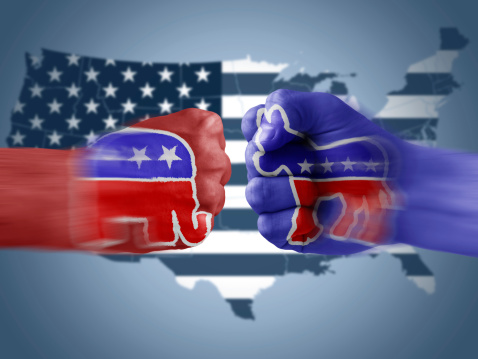By Cliff Ennico
“A number of years ago some friends and I formed a nonprofit organization to benefit a certain group in our community, and was granted tax-exempt status by the IRS under Section 501(c)(3) of the Internal Revenue Code.
We strongly feel that our mission will be impacted by the outcome of this year’s Presidential election. Both our attorney and accountant, however, are telling us we will lose our tax-exempt status if we get involved in any kind of political activity. We see nonprofits lobbying for change all over the place – how do they get away with it?”
This is one of the toughest questions for nonprofits, and the IRS rules don’t make it easy.
To start with, we need to distinguish between “political activity” and “lobbying activity,” as the IRS treats the two very differently.
“Political activity” means taking sides in an election or other political contest: you favor one candidate over the other. If you are a 501(c)(3) organization, you cannot – CANNOT – under any circumstances engage in “political activity.”
Any sort of bias, partisanship or favoritism will get you into trouble here, such as:
- Hosting an event and inviting a political candidate to make a campaign speech;
- Publishing materials that support (or oppose) a candidate;
- Donating money to a political candidate;
- Any statements by your organization’s executive director, in his or her official capacity, that support a candidate;
- Criticizing or supporting a candidate on your organization’s website, or linking to just one candidate’s profile;
- Inviting one candidate to speak at a well-publicized and well-attended event, and inviting the other candidate to speak at a lesser function;
- Inviting all candidates to speak at an event, but arranging the event or choosing the questions in such a way that it is obvious that your organization favors one candidate over the others; and
- Conducting a “get out the vote” telephone drive in a partisan manner by selecting caller responses for further follow-up based on candidate preference.
Your organization may engage in non-partisan voter registration drives, non-partisan candidate debates, and non-partisan voter education, as long as these activities fulfill its exempt purpose. Your organization can also engage in legislative advocacy and issue-related advocacy, as long as it does so very, very carefully.
Which brings us to “lobbying activity.” Basically, for IRS purposes, your nonprofit engages in lobbying anytime it attempts to persuade members of a legislative or regulatory body to propose, support, oppose, amend, or repeal legislation or regulations.
The vast majority of nonprofits use the IRS’s “substantial part test” to determine how much they can lobby. Under this test, a nonprofit will qualify for tax-exempt status as long as no “substantial part” of its activities relates to influencing legislation or publishing propaganda. Unfortunately, this has never been clearly defined by either the IRS or the courts.
Like determining whether someone is an “employee” or an “independent contractor”, the IRS and the courts weigh a number of factors such as the amount of time your directors, officers and staff devote to lobbying and the amount of money your organization spends on lobbying. For example, one court found that a nonprofit’s lobbying was not substantial because it constituted less than five percent of the total time spent by the organization’s staff (as determined by timesheets). Another court found that lobbying was substantial where it exceeded 16% to 20% of a nonprofit’s total expenditures. It is tempting, but risky, to use these figures as a rule of thumb—spending anything less than five per cent of the nonprofit’s total budget is minor lobbying, while spending anything over the 16% to 20% range is substantial lobbying. But there’s no guarantee the IRS will recognize these “rules of thumb” in a particular case.
The consequences of devoting too much time and money to lobbying are severe. The IRS can:
- Revoke your organization’s tax-exempt status for the year, subjecting its entire income to federal and state taxes;
- Deny your donors tax deductions for their charitable contributions; and
- Impose an excise tax of five percent of your lobbying expenses, and hold your directors personally accountable for the tax.
If you are unsure whether or not your organization is devoting too much time to lobbying, the IRS does allow you to ask for an informal ruling. Your organization will need to fill out IRS Form 5768 (available as a free download from www.irs.gov).
If lobbying is going to be a significant part of your activities, your organization may need to be reclassified as a “social benefit organization” under Section 501(c)(4) of the Internal Revenue Code. Virtually all lobbying and advocacy groups are formed under this Section, which allows you to operate tax-free but does not allow you to accept tax-deductible donations.
Unfortunately, being allowed to raise money tax-free from the public means you may have to stand on the sidelines and grind your teeth between now and November. Pretty much like the rest of us.
Cliff Ennico (cennico@legalcareer.com) is a syndicated columnist, author and host of the PBS television series ‘Money Hunt’. This column is no substitute for legal, tax or financial advice, which can be furnished only by a qualified professional licensed in your state. To find out more about Cliff Ennico and other Creators Syndicate writers and cartoonists, visit our Web page at www.creators.com. COPYRIGHT 2016 CLIFFORD R. ENNICO. DISTRIBUTED BY CREATORS SYNDICATE, INC. @CliffEnnico







